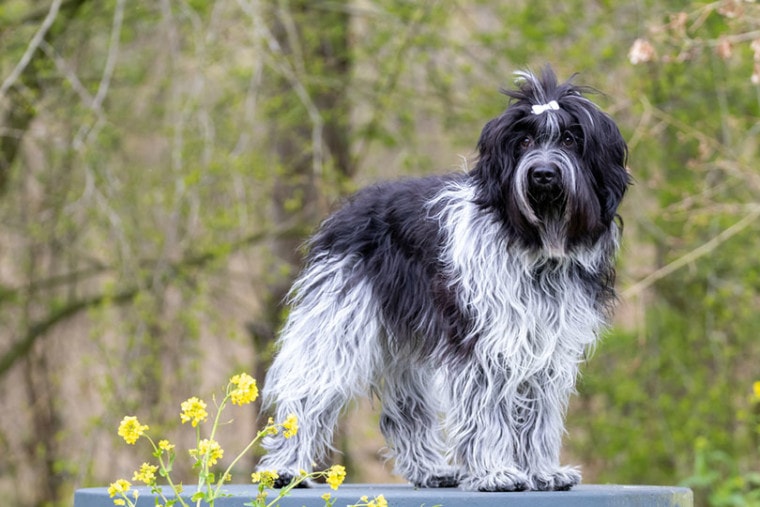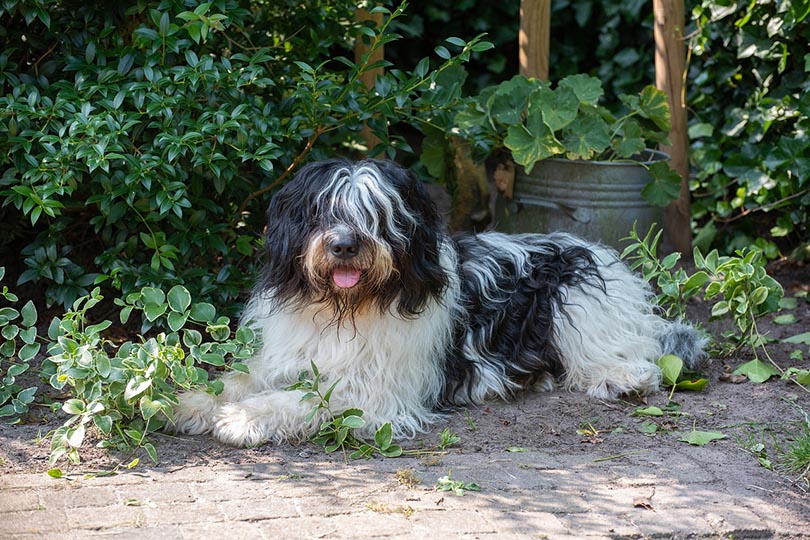
Click Below to Skip Ahead
Also known as the Dutch Sheepdog, the Schapendoes is a wavy-haired, medium-sized herding dog who hails from the Netherlands originally. Adorably scruffy with a friendly and cheerful personality, Schapendoes are not a well-known or widely available breed in America but that may very well change once more dog lovers become familiar with them!
Breed Overview
Height:
16 – 20 inches
Weight:
26 – 55 pounds
Lifespan:
12 – 15 years
Colors:
Beige, black, brown, gray, white, solid color with white, tri-color
Suitable for:
Active individuals and families with time to exercise and socialize their dog and a sense of humor
Temperament:
Intelligent, athletic, independent, watchful, affectionate with family, good with other pets
Schapendoes make excellent family dogs thanks to their playful, energetic nature. If you’re on the hunt for a new furry family member, keep reading to learn more about the Schapendoes and decide if they might be a good fit for your household.
Schapendoes Characteristics

Schapendoes Puppies
The Schapendoes is not common in the U.S. and there’s a good chance you’ll need to pay for either a road trip or shipping costs to take possession of your new puppy. They are more widespread in Europe, especially their Dutch homeland. If you wind up having to buy from a European breeder, you’ll have extra costs for health checks and certificates, as well as shipping.
Owners who have their hearts set on adoption may have a tough time finding this breed available in the United States. There just aren’t very many Schapendoes available to begin with, let alone those in need of new homes. Many breeders will take back and re-home their dogs that don’t work out in new homes so they could be your best source when it comes to adopting a Schapendoes.
Temperament & Intelligence of the Schapendoes
Friendly, cheerful, and always on the alert, Schapendoes are both affectionate family companions and vigilant watchdogs. They are athletic and energetic dogs, especially known for their impressive jumping ability. Developed as herding and farm dogs, Schapendoes are intelligent and eager to please, though they can also be independent by nature.
Are These Dogs Good for Families? 👪
In general, Schapendoes make wonderful family dogs. As a medium-sized breed, they are sturdy enough to serve as a playmate for children without being so large as to overwhelm small kids. Schapendoes are friendly and loving towards their family and other people they know, though they may be suspicious of strangers.
Socialization is essential for these dogs to make sure they don’t let their natural wariness of strangers turn into bad manners or aggression. Like many herding dogs, Schapendoes may also feel the need to try and treat unruly kids like rogue sheep and attempt to nudge and control them. This behavior should be discouraged to avoid any injuries to kids or dogs.
As with any dog, children, especially younger ones, should be supervised when interacting with the Schapendoes. Older children may enjoy taking an active role in training and learning canine sports with the active Schapendoes.
Does This Breed Get Along with Other Pets?
Schapendoes generally get along well with other dogs when properly introduced and socialized. As farm dogs, Schapendoes had to co-exist with all sorts of other animals and they don’t have a high prey drive like some other breeds. They can also live peacefully with cats, especially when they are raised together.
Even if a Schapendoes isn’t prone to being aggressive towards small exotic pets, it’s usually a good idea to keep such creatures away from any animal they might view as a predator to avoid stress.

Things to Know When Owning a Schapendoes:
Like what you’ve learned so far about the Schapendoes? Before you start your hunt for a breeder, here are some more details about what you can expect when owning one of these dogs.
Food & Diet Requirements 🦴
Your Schapendoes should do just fine on any nutritionally balanced dog food, canned or dry. Make sure you feed the correct diet for your dog’s current life stage—puppy, adult, or senior. Either a commercial or homemade diet can be offered, as long as you work with your vet to make sure the home-cooked food is also properly balanced.
A Schapendoes’ daily calorie requirements will vary depending on how active they are and whether they regularly participate in canine sports or herding. Your veterinarian can help you determine the right amount of food and treats to offer your dog to maintain a healthy weight.
Exercise 🐕
Schapendoes are energetic and athletic dogs who will need at least an hour of exercise per day. They don’t necessarily need to live in a house with a fenced yard to play in but they will need several walks per day if they don’t. Speaking of fences, yours will probably need to be higher than you think to contain a Schapendoes, who are famously talented jumpers.
Because of their intelligence, Schapendoes will need mental as well as physical stimulation every day. They enjoy having a job to do or learning tricks and commands. Because of their athletic ability, Schapendoes make excellent candidates for participating in agility, flyball, or other dog sports competitions.

Training 🎾
With their working dog heritage, Schapendoes are prone to being independent thinkers, the key to allowing them to do their jobs with minimal supervision from farmers. However, they’re also very eager to please, making them easier to train than other independent-minded breeds.
Positive, reward-based training should be very effective for the Schapendoes. Training should begin as early as possible when you bring your puppy home. As we mentioned earlier, Schapendoes should be socialized to other people, animals, and situations from a young age to help them grow into calm, balanced adult dogs.
Grooming ✂️
Schapendoes are double-coated dogs, with a long, rougher overcoat covering a softer, insulating undercoat. Their grooming needs aren’t complicated, nor do they shed excessively. The breed is meant to look a bit shaggy and they usually don’t need to have their hair trimmed or clipped.
A good brushing 2-3 times per week can help keep the Schapendoes coat free of mats and tangles. Pay extra attention to keeping young Schapendoes tangle-free as they begin to grow their adult coats.
Keep your Schapendoes nails trimmed, ears cleaned, and teeth brushed regularly as well.
Health and Conditions 🏥
Overall, Schapendoes are a fairly healthy breed, with few inherited conditions. Responsible breeders will always be upfront about any possible issues with their dogs and what health screenings they’ve performed. Don’t be afraid to ask questions to make sure you start out with the healthiest puppy possible.
Serious Conditions:
Minor Conditions:
Male vs Female
Male Schapendoes are usually a little bit heavier than females, with a thicker, fuller coat. They can be more prone to dominant behaviors, especially if they aren’t neutered. Unspayed female Schapendoes can be moody around the time they go into heat.
Having a Schapendoes spayed or neutered goes a long way towards making them more even-tempered and eliminating some of the personality differences between males and females. It’s also healthier overall for the dogs, especially if they aren’t going to be used for breeding. Spaying for a female is usually more expensive, which is something to keep in mind as you decide between the two genders.

3 Little-Known Facts About the Schapendoes
1. They haven’t been formally recognized for very long.
The Schapendoes originates from the farmlands of the 19th century Netherlands, but the breed wasn’t officially recognized until 1971. The United Kennel Club in England accepted the breed in 2006, although the American Kennel Club has yet to do so.
2. They nearly went extinct.
In the 1940s, Schapendoes nearly disappeared from their native country thanks to competition from another famous herding dog: Border Collies. Imported Border Collies became the favored farm dog in the Netherlands during this period and Schapendoes declined to the point that the breed almost went extinct. Fortunately, that didn’t happen.
3. Their feet are almost always lighter than their body.
Schapendoes come in many different colors but no matter what their coat color, the fur on their feet is almost always lighter.


Conclusion
Though you might have a hard time finding a breeder, Schapendoes make friendly and funny pets who fit in well with many different families and living situations. Lovers of this breed find the effort it takes to obtain one well worth it! They may just be the right breed for you but before committing to any new pet, make sure you and everyone in your family are ready for the responsibility. Owning a pet is a privilege not to be taken lightly and you owe it to your new Schapendoes to make sure you’re prepared for a lifetime commitment.
Featured Image Credit: Edwin Butter, Shutterstock







